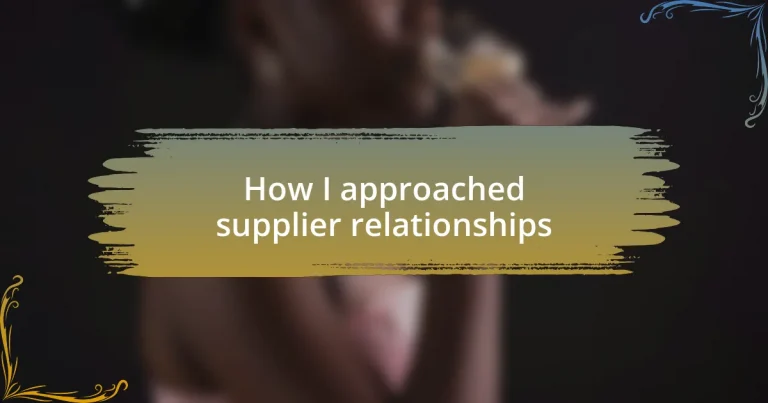Key takeaways:
- Building strong supplier relationships requires trust, communication, and mutual respect, fostering a sense of community beyond transactions.
- Proactive communication and regular check-ins can strengthen supplier bonds and enhance collaboration, leading to greater innovation.
- Honesty and sharing personal experiences with suppliers can build trust and deepen partnerships, emphasizing the importance of celebrating shared successes.
Author: Clara Whitmore
Bio: Clara Whitmore is an acclaimed author and storyteller known for her captivating narratives and richly drawn characters. Her work spans several genres, including contemporary fiction and historical romance, often weaving elements of personal experience into her writing. Clara holds a Master’s degree in Creative Writing from the University of Edinburgh and has published three novels, which have garnered critical acclaim and a loyal readership. When she’s not writing, Clara enjoys exploring quaint bookstores and hosting literary workshops. She currently resides in Portland, Oregon, with her dog, Jasper.
Understanding supplier relationships
Building strong supplier relationships is like nurturing a partnership; it requires trust, communication, and mutual respect. I remember my first experience with a supplier who was hesitant to share specific information about their production process. That initial wall made me wonder: How can we truly collaborate if we’re not transparent with each other?
Over time, I learned that asking open-ended questions often leads to deeper conversations. When I reached out to my suppliers, genuinely interested in their challenges and successes, I found that they opened up about their needs too. This two-way communication not only fostered a sense of camaraderie but also helped us adapt our strategies to better fit each other’s objectives.
In the world of alcohol reviews, understanding the motivations and concerns of suppliers can significantly impact your collaborations. When I took the time to understand their perspectives, I often felt like I was bridging a crucial gap. It’s not simply about transactions; it’s about building a community where both parties thrive and grow.
Importance of supplier relationships
Supplier relationships are the backbone of a successful alcohol review platform. I often reflect on a particular partnership that transformed my understanding of this importance. During a challenging period with a supplier, I realized how vital it is to be proactive in communication. It wasn’t just about meeting deadlines; it was about being a reliable ally, which ultimately saved us both a lot of stress.
When I think about the impact of these relationships, I realize they go beyond business; they cultivate a sense of loyalty. I recall a time when a supplier went out of their way to deliver a special batch for our tasting event. That gesture made me appreciate not just the product, but the person behind it. How often do we pause to consider the lengths our suppliers go for us? It’s these moments that turn a basic transaction into a lasting partnership.
Moreover, strong supplier relationships foster innovation and improvement. When suppliers trust you, they’re more likely to share valuable insights and new offerings. I remember brainstorming with a supplier about unique tasting experiences that would set us apart. That collaboration not only enriched our content but also drove mutual growth—showing me that when suppliers feel valued, everyone wins.
Strategies for effective communication
Effective communication with suppliers isn’t just about exchanging information; it’s about building trust. I learned this firsthand during a crucial phase where I took extra time to listen to my supplier’s concerns. That moment, I realized how pivotal it was to create a space where both parties could share ideas without hesitation. Have you ever experienced that shift in conversation when trust is established? The difference is palpable.
One key strategy I’ve adopted is regular check-ins. Early in my journey, I noticed that sporadic contact often led to misunderstandings. So, I made it a point to set up monthly calls, not just to discuss orders or deadlines but to catch up on industry trends and share insights. This consistent communication not only kept us aligned but also strengthened our bond. It’s interesting how a simple phone call can deepen a relationship, isn’t it?
Additionally, I discovered the power of honesty, even when the news isn’t positive. I once had to inform a supplier about an unexpected change in our project timeline. Rather than softening the blow, I chose transparency, explaining the situation clearly. To my surprise, this honesty fostered a greater sense of collaboration moving forward. Have you ever considered how authenticity can pave the way for solutions rather than problems? It certainly transformed my approach.
Building trust with suppliers
Building trust with suppliers is a nuanced endeavor that requires patience and intentionality. I remember a time when I shared a personal story about a challenge I faced in sourcing materials. This openness didn’t just humanize our interactions; it allowed my supplier to understand the pressures I was under. Have you ever noticed how vulnerability can strip away barriers? In my case, it led to greater dedication on their part, as they felt more invested in my success.
One of the most profound lessons I learned was the importance of consistency. Early on, I committed to delivering feedback on their products promptly. For instance, when they introduced a new item, I made it a priority to provide my honest thoughts within the week. This reliability proved crucial; it showed my supplier that I valued their efforts and considered their products thoughtfully. Isn’t it fascinating how a simple act of acknowledging someone’s work can solidify trust?
Moreover, I discovered the significance of celebrating small wins together. I recall a period when we launched a joint promotional effort that exceeded our expectations. By taking the time to celebrate that success with my supplier, I reinforced our partnership’s value. Reflecting on that moment, I realized that trust isn’t built solely through words or strategies; it flourishes when both parties recognize and celebrate their shared achievements. How do you create celebrations in your own professional relationships?
Assessing supplier performance
Assessing supplier performance
When it comes to assessing supplier performance, I believe in a holistic approach. It’s not just about metrics; it’s about how well their values align with mine. There was a moment when a supplier consistently delivered late, impacting my ability to meet customer expectations. I had to reevaluate our partnership, asking myself, “Are they truly invested in our shared success, or is it just a transactional relationship?”
A critical aspect of performance assessment for me is open communication. After a shipment arrived with damaged goods, I took the time to discuss the issue directly with my supplier. Instead of placing blame, I shared how it affected my operations. This conversation not only clarified my needs but also provided insights into their processes. Have you ever had a conversation that turned a setback into a breakthrough?
Moreover, I’ve learned that utilizing customer feedback can be incredibly valuable. Through reviews, I gathered insights about how my customers reacted to a supplier’s products. I shared this feedback with my supplier, emphasizing how their performance directly influenced my business. This practice helped us both understand our impact in the market better. It begs the question: how often do we integrate customer perspectives to enhance our supplier relationships?
Lessons learned from my experiences
Trust is fundamental in any supplier relationship, and I learned this the hard way. Early on, I overlooked some red flags simply because I liked the products. When a shipment arrived late, I felt a mix of frustration and disappointment. That experience taught me the importance of establishing clear expectations and maintaining a level of transparency; building trust requires diligence on both sides.
I’ve also come to appreciate the power of adaptability. I remember a time when a supplier changed their product line, which disrupted my inventory planning. Instead of panicking, I initiated a dialogue to explore alternative solutions. This openness created a cooperative environment that not only salvaged our partnership but also sparked innovative ideas for future collaboration. Isn’t it amazing how challenges can lead to growth when approached with the right mindset?
Lastly, I’ve recognized that an effective relationship goes beyond mere transactions. I started spending time getting to know my suppliers personally. Turns out, sharing a laugh over a tough day or discussing industry trends can strengthen bonds. Each conversation deepened our connection, transforming our business relationship into a partnership rooted in mutual respect and understanding. Isn’t that the kind of collaboration we all strive for?


